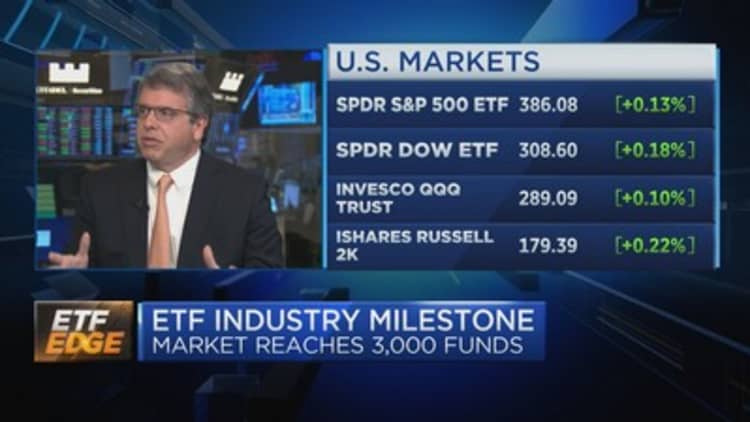

ETFs are seeing a record surge in popularity.
The industry hit a milestone with more than 3,000 ETFs trading simultaneously for the first time ever this month — a 30% increase since December 2020, according to Morningstar.
And this year investors are taking more active strategies, such as single-stock ETFs that offer traders exposure to the daily performance of a singular stock like Tesla or Apple.
“We started off with basically taking very broad index funds — SPY [SPDR S&P 500 ETF Trust] was the first one — and then the industry over the years built all these interesting overlays,” Nick Colas, co-founder of DataTrek Research, told Bob Pisani on CNBC’s “ETF Edge” this week.
Included were sector and emerging funds, as well as funds specified to themes such as clean energy and legal marijuana, Colas said, as part of a shift from disruptive innovation to mainstream.
“Investors now are really spoiled for choice among just being able to pick not only the big sector funds or the big overall funds but any kind of fund they think might be interesting,” he added.
However, this move toward specificity of thematic ETFs like cybersecurity ETFs has its risks, according to investment consultant Charles Ellis, the author of two upcoming books, “Inside Vanguard” and “Figuring It Out.” While Ellis believes those who go into ETFs to later dive into index funds will do fine, those choosing highly specialized ETFs are at risk of making disastrous mistakes.
“The more you get specific, the more the odds are high that you won’t be able to make a rational long-term decision and you will get suckered into making, because we’re all human beings, an emotional short-term decision, and you won’t like the outcome in the long run,” Ellis said.
Another milestone
With quick growth in the number of ETFs, investors will soon celebrate another milestone. In January 2023, the first ETF — SPDR S&P 500 ETF Trust — will turn 30 years old. Now the largest ETF and one of the world’s largest funds, SPY is valued at $350 billion in assets under management.
Colas said SPY was exactly the right product to start with, unlike emerging market ETFs which had lousy returns after its boom and bust cycle.
The growth of ETFs and more active funds stems in part from people in mediocre mutual funds converting to ETFs, said Pisani. Colas said there are fewer associated fees with ETFs than mutual funds, as well as less of a tax liability.
